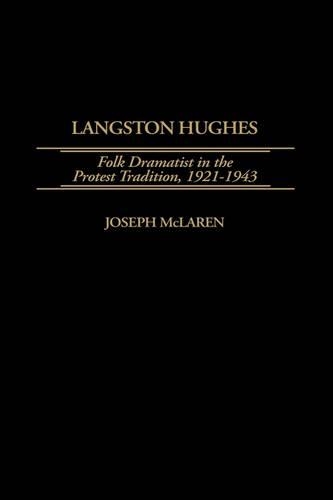
Langston Hughes: Folk Dramatist in the Protest Tradition, 1921-1943
(Hardback)
Publishing Details
Langston Hughes: Folk Dramatist in the Protest Tradition, 1921-1943
By (Author) Joseph McLaren
Bloomsbury Publishing PLC
Praeger Publishers Inc
9th December 1997
United States
Classifications
Tertiary Education
Non Fiction
812.52
Physical Properties
Hardback
248
Width 156mm, Height 235mm
567g
Description
Though known primarily as a poet, Langston Hughes crafted well over 40 theatrical works. This book examines Hughes's stage pieces from his first published play, The Gold Piece (1921), through his post-radical wartime effort, For This We Fight (1943). Hughes's stage writing of this period includes such forms as the folk comedy, the protest drama, the historical play and the blues opera. McLaren concludes that the democratic argument is ultimately employed by Hughes to challenge segregation in the military and that Hughes's iconography prefigures the black aesthetic of the 1960s. Photographs complement the text. McLaren demonstrates that Hughes's folk comedies, such as Mule Bone (1930) and Little Ham (1936), valorize folk humor and black vernacular. Written in collaboration with Zora Neale Hurston, Mule Bone resulted in a literary controversy. The study also analyzes Hughes's radical plays, including Scottsboro Limited (1931) and Don't You Want to Be Free (1938), which blend poetry and drama. Also addressed is Hughes's association with community drama groups, especially Karamu Theatre in Cleveland and the Harlem Suitcase Theatre, which premiered Don't You Want to Be Free and a number of Hughes's satires. In the early 1940s, Hughes entered his post-radical period but continued to protest fascism and celebrate black heroes and heroines. This transition is reflected in his critique of Richard Wright's Native Son. McLaren concludes that the democratic argument is used to challenge segregation in the military and that Hughes's iconography prefigures the black aesthetic of the 1960s. This book will be of great interest to students and scholars of radical theatre and African American drama. Photographs complement the text.
Author Bio
JOSEPH McLAREN is an Associate Professor of English at Hofstra University. A specialist in African American literature and African literature in English, he has written numerous articles on diverse literary and cultural topics. His writings have appeared in such reference works as Masterpieces of African-American Literature and The African American Encyclopedia. He has presented papers at national and international conferences of the Popular Culture Association and the African Literature Association.
